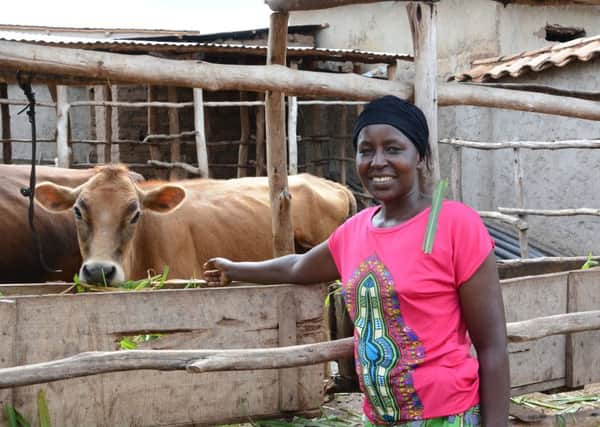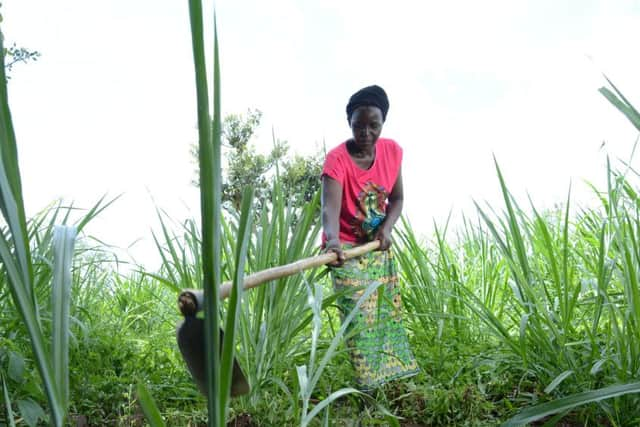Jersey cow is eradicating hunger and poverty in Rwanda


It might seem like an unlikely destination but the event gathered experts from across the globe who visited Send a Cow Rwanda to discover how the Jersey cow is helping to eradicate hunger and poverty across the country.
Jersey cows are not usually associated with international development programmes, but in Rwanda, the breed is giving families a sustainable route out of poverty. Where resources are scarce, Jersey bred cows have some real benefits, producing high yields of particularly nutritious milk.
Advertisement
Advertisement
The majority of the population in Rwanda depend on small-scale farming for their livelihoods. But because productivity is low, many are living in poverty and 37% of children under five are stunted due to malnutrition. The impact of this stunting sadly lasts throughout their lifetimes.


Send a Cow is working with Jersey Overseas Aid and The Royal Jersey Agricultural and Horticultural Society, to bring the benefits of the Jersey breed to farmers and their families, across the whole of Rwanda, through the Jersey Inka Nziza project.
Compared to other international breeds or even local Rwandan cattle, Jersey cows have the distinct advantage of requiring half the amount of fodder to produce the same yields, or higher. A much smaller animal, the Jersey breed is reportedly 69% more tolerant of the climate and heat in Rwanda than other breeds normally favoured for dairy production.
Andre Nsengiyumva, country director for Send a Cow Rwanda and Burundi told us about the impact of the Jersey Inka Nziza project to date:
Advertisement
Advertisement
“We’ve seen some very impressive results from the first phase of the project, especially the monthly milk production which has increased from up to 167 to 247 litres due to better husbandry techniques. This means families can sell some of their cow’s milk to generate an income, pay for vital supplies and send their children to school.
“The vast majority of Rwandan farmers involved in the project only have one or two cows but they provide people with a lifeline – milk and manure to grow vegetables means children don’t grow up stunted. Small scale farmers can now give their children a future free of hunger and afford to give them an education.”
Families in Rwanda are already noticing the difference in their day to day lives and the health of their children. Jeanette (photos left) said:
“My oldest Jersey bred cow is called ‘The Famous One’! I think that Jersey cows are easier to look after, consume less fodder and produce a better quality and creamier milk than Friesians. My children and nieces and nephews much prefer the Jersey milk, too.”
Advertisement
Advertisement
Families in the region, who live on subsistence agriculture, are able to produce better crops of vegetables from fertilising the soil with cow manure, but the Jersey bred cows themselves require less feed, freeing up land to be cultivated directly for food.
There’s a cultural importance of the cow in Rwanda, too. The Send a Cow Jersey Inka Nziza programme aligns with the work of the government of Rwanda’s Girinka programme of one cow per poor family, as the route out of poverty and malnutrition for rural people.
Jersey cross-bred cows consume less water per litre of milk produced – making them ideal for Rwandan smallholders. The Jersey Inka Nziza project is therefore working to increase the numbers of cows cross-bred with the Jersey by training Artificial Insemination technicians, throughout the districts of Rulindo, Kayonza, Rwamagnana and Bugesera.
Many farmers in these regions don’t have the knowledge of how to manage their livestock well, and unpredictable weather patterns due to climate change make farming even more challenging. The Paravets programme which is part of Send a Cow’s holistic programme means that participants who are particularly interested in animal husbandry can learn these skills to support their fellow farmers, and earn an income. The Paravets training allows for milk production to increase despite the difficulties of farming in unpredictable climate.
Advertisement
Advertisement
With support from Jersey Overseas Aid, Send a Cow is working with 12,000 households to improve dairy cow management and increase milk production so Rwandan families can eradicate hunger and poverty, for good.